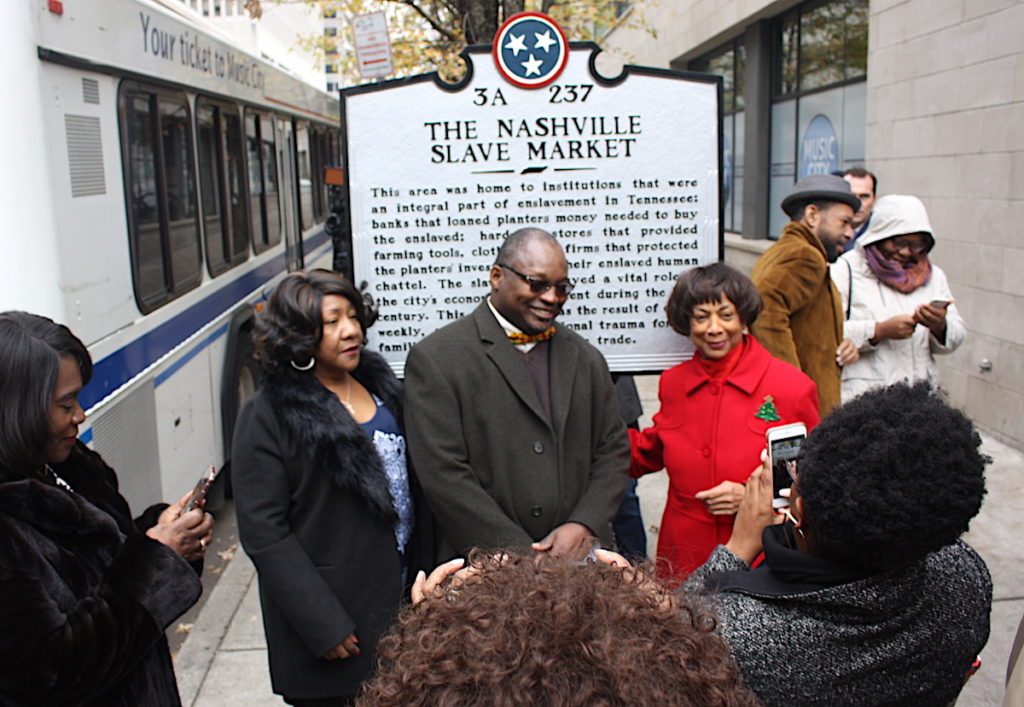
Nashville is filled with Black history — but in some of the city’s most prominent places, physical reminders are missing.
There are some markers, but they don’t come close to telling the whole story, says Tennessee State University Professor Dr. Learotha Williams Jr. He says that’s often because Black history is painful and we’d rather “celebrate the good stuff.”.
“But in doing that you are telling half-truths,” Williams says. “You are clouding the truth. You are, in some instances, just blatantly lying to people and intellectually, that is an unhealthy behavior.”
Williams has been involved in trying to address these missing pieces through projects, organizations and sometimes as one of the only Black voices in rooms of white decision makers.
He spoke with WPLN’s Jason Moon Wilkins on the eve of Juneteenth.
Interview Highlights:
You’ve been involved in a number of efforts across Nashville — a couple years ago you helped to get a marker erected downtown to honor the slave market that was there. Why is it so important to have these physical reminders of the historical context?
Dr. Learotha Willams Jr.: Now, I’ll be blunt. There’s been a concerted effort to erase black people from the narrative. My first job was in Savannah, Ga. You could go to one of the many regal houses that are downtown. You’ll hear them tell their story, but they never mentioned anything about the African Americans that made those places be everything that folks were celebrating and making money off of, right? I did that in Savannah, so it was really easy to transform all that to Nashville. Nashville has a peculiar story too because it was the second largest slave market in Tennessee. And then when you start thinking about the major centers of the city that we still celebrate, in a lot of ways, like the Public Square — I defy anybody to go to the Public Square and look at an old map of the businesses that were there and show me how they were not in some way connected, sometimes intimately connected, to the enslavement of blacks in Tennessee.
There are a lot of discussions right now about Confederate monuments and what’s happening at the state capitol. There are places like Franklin, for example and the Fuller story group, that are trying to put up historical markers honoring African Americans or maybe giving context to a Confederate site. Do you feel efforts like that can be successful?
LW: Everybody who lives in Franklin knows intuitively why the war was fought and they know when those statues were put up and they know by whom. It’s a start, because we need to highlight that African Americans were in these spaces. We need to highlight the fact that within the shadow of where the (Confederate) statue is, a man was lynched. We need to acknowledge the fact that much of what Franklin became, much of what Williamson County became. If you’re gonna tell the history, if you’re really concerned about telling the history, tell the history about how it became wealthy off the backs of uncompensated black labor and all that that entailed.
How do you think Nashville can do a better job of not only intertwining this history, physically in the streets, but also maybe even the imagery it projects, when you think about the way that Nashville is promoted to the world?
LW: First it needs to come to grips with its own history and being truthful with itself. I’m working with “We Remember Nashville,” and what we’re trying to do is to place markers at the sites of all of the lynchings that occurred in Nashville. We know this. We know where these things occurred. But I think that the city has done a fairly good job of erasing all of this stuff from the history books and from public memory. That slave marker we put up at the corner of Fourth and Charlotte — that came as a result of a student I had. She got upset and challenged me. She said, “Dr. Williams, I’ve lived here my whole life, and nobody has ever told me about this. How come we aren’t taught this in school?” But that’s just one street corner. So, all that is to say, just have informed African Americans in the places where these decisions are made.

